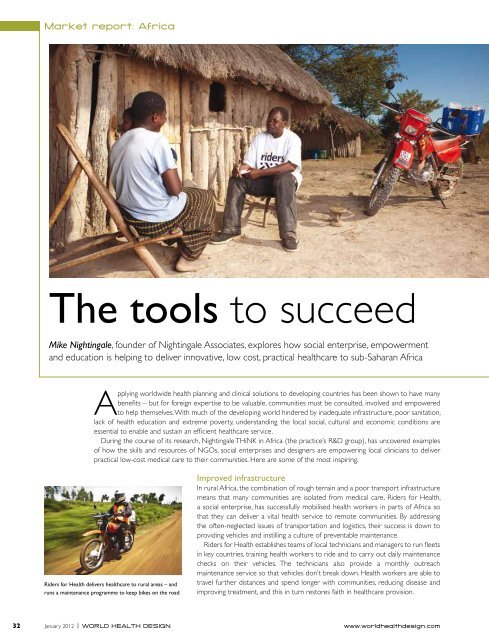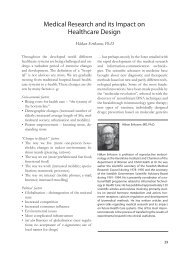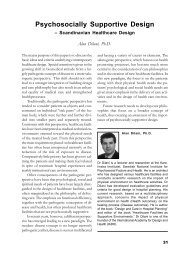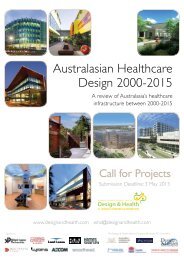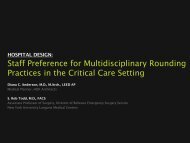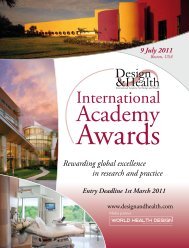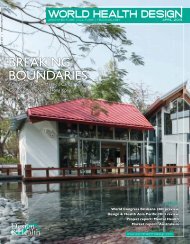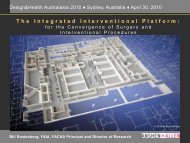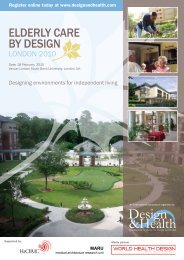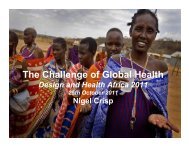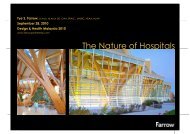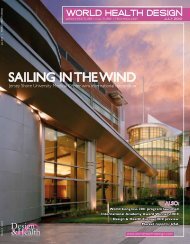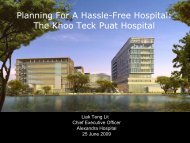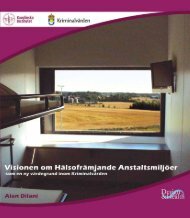RESTORATIVE SpAcE - the International Academy of Design and ...
RESTORATIVE SpAcE - the International Academy of Design and ...
RESTORATIVE SpAcE - the International Academy of Design and ...
Create successful ePaper yourself
Turn your PDF publications into a flip-book with our unique Google optimized e-Paper software.
Market report: Africa<br />
The tools to succeed<br />
Mike Nightingale, founder <strong>of</strong> Nightingale Associates, explores how social enterprise, empowerment<br />
<strong>and</strong> education is helping to deliver innovative, low cost, practical healthcare to sub-Saharan Africa<br />
Applying worldwide health planning <strong>and</strong> clinical solutions to developing countries has been shown to have many<br />
benefits – but for foreign expertise to be valuable, communities must be consulted, involved <strong>and</strong> empowered<br />
to help <strong>the</strong>mselves. With much <strong>of</strong> <strong>the</strong> developing world hindered by inadequate infrastructure, poor sanitation,<br />
lack <strong>of</strong> health education <strong>and</strong> extreme poverty, underst<strong>and</strong>ing <strong>the</strong> local social, cultural <strong>and</strong> economic conditions are<br />
essential to enable <strong>and</strong> sustain an efficient healthcare service.<br />
During <strong>the</strong> course <strong>of</strong> its research, Nightingale THiNK in Africa (<strong>the</strong> practice’s R&D group), has uncovered examples<br />
<strong>of</strong> how <strong>the</strong> skills <strong>and</strong> resources <strong>of</strong> NGOs, social enterprises <strong>and</strong> designers are empowering local clinicians to deliver<br />
practical low-cost medical care to <strong>the</strong>ir communities. Here are some <strong>of</strong> <strong>the</strong> most inspiring.<br />
Riders for Health delivers healthcare to rural areas – <strong>and</strong><br />
runs a maintenance programme to keep bikes on <strong>the</strong> road<br />
Improved infrastructure<br />
In rural Africa, <strong>the</strong> combination <strong>of</strong> rough terrain <strong>and</strong> a poor transport infrastructure<br />
means that many communities are isolated from medical care. Riders for Health,<br />
a social enterprise, has successfully mobilised health workers in parts <strong>of</strong> Africa so<br />
that <strong>the</strong>y can deliver a vital health service to remote communities. By addressing<br />
<strong>the</strong> <strong>of</strong>ten-neglected issues <strong>of</strong> transportation <strong>and</strong> logistics, <strong>the</strong>ir success is down to<br />
providing vehicles <strong>and</strong> instilling a culture <strong>of</strong> preventable maintenance.<br />
Riders for Health establishes teams <strong>of</strong> local technicians <strong>and</strong> managers to run fleets<br />
in key countries, training health workers to ride <strong>and</strong> to carry out daily maintenance<br />
checks on <strong>the</strong>ir vehicles. The technicians also provide a monthly outreach<br />
maintenance service so that vehicles don’t break down. Health workers are able to<br />
travel fur<strong>the</strong>r distances <strong>and</strong> spend longer with communities, reducing disease <strong>and</strong><br />
improving treatment, <strong>and</strong> this in turn restores faith in healthcare provision.<br />
32 January 2012 | WORLD HEALTH DESIGN www.worldhealthdesign.com


